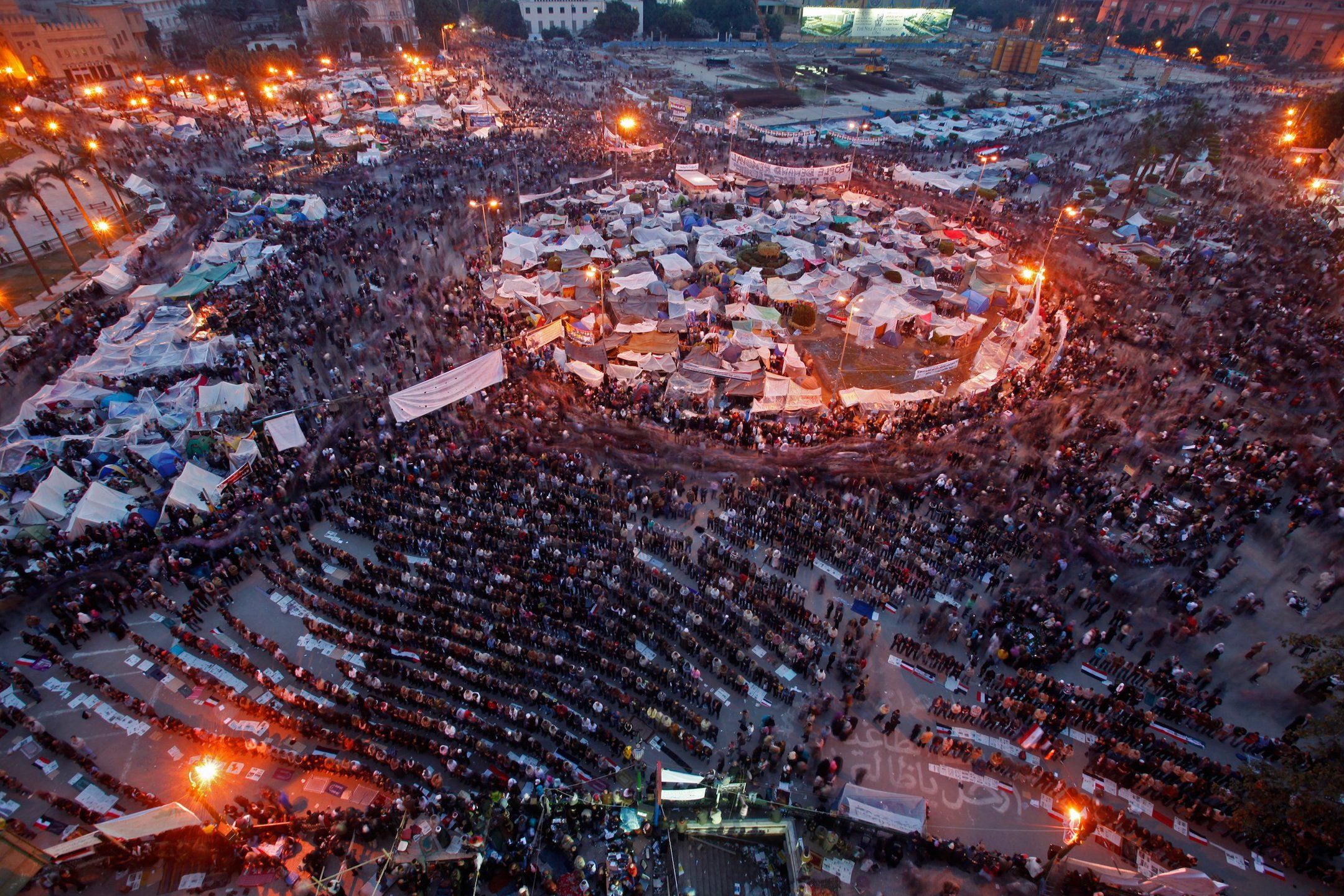By Chlotrudis Independent Film Society
Rating: 5 cats
Director: Jehane Noujaim

Country: egypt, united_states
Year: 2013
Running time: 108
IMDB: http://www.imdb.com/title/tt2486682/combined
Jason says: “THE SQUARE doesn’t necessarily look like much as it starts; just some people who happened to have a camera in the right place at the right time. Make no mistake; that is an incredibly useful thing for a documentary to have, and often produces the most memorable moment in that sort of movie, but is a foundation? Not usually. Most, though, don’t (or can’t) keep having the camera in the right place, either to continue capturing history or the personal narratives of the people involved, not to mention filmmakers who can assemble all of this into something that’s more than just a series of events strung together.
“Director Jehane Noujaim introduces us to six activists who were at the original January 2011 demonstrations in Cairo’s Tahrir Square right off the bat, though she does not spread attention evenly among them. Pierre Seyoufr and Aida Elkashef, for instance, will have recurring but minor roles in the film; musician Ramy Essam is somewhat more prominent, and not just because his protest songs liven the presentation up. The main focus falls upon three other men: Ahmed Hassan is a young man who has lived his entire life under Hosni Mubarak’s corrupt regime and desires a true democracy; Magdy Ashour is a father of five and a member of the Muslim Brotherhood; and Khalid Abdalla is a British actor (best known for THE KITE RUNNER) whose parents are Egyptian expatriates. And while their peaceful protests soon lead to Mubarak’s resignation, the next step proves to be far more complicated and less friendly.
“Noujaim’s specialty is placing viewers right in the middle of a situation, and while there are some clips from news programs used to fill in a little more background, the majority is captured right in the thick of things, either in the midst of the action or in the subjects’ homes. Sometimes Ahmed is the one holding the camera, sometimes Noujaim or one of a half-dozen other cinematographers and camera operators – some of whom are, themselves, part of the revolution, and likely recording not just to make a movie but in case video is needed as evidence. And while the claim is often made that good journalism means a strict separation between reporter and subject, the overlap here allows Nojaim to capture what is going on among the revolutionaries without filter. There is so little barrier that even when Ahmed or Khalid looks into the camera and speaks directly to the viewer, it does not feel like the interview footage with various army representatives, nor does it seem like breaking the fourth wall, making us included in the conversation rather than just privy to it.
“It’s because of that inclusion that the situations faced by the three main subjects become engrossing. Over the two years that THE SQUARE covers, we don’t necessarily see them change that much – they are able to be the film’s protagonists because they are committed men – but the way that they carry themselves changes, with Ahmed maturing from the young man who rebels without thinking and Khalid admirably maintaining his commitment when others flag but also, perhaps, demonstrating the weakness of a revolutionary stance because of his disdain for politics. The well-organized Muslim Brotherhood does not share that distaste, and that’s what often makes Magdy the most fascinating figure in the movie: He struggles with trying to balance his loyalty to the party’s ideology with the closeness he feels to the other, more secular, revolutionaries. In many ways, the most memorable scene in the film is the one where he observes his son Assem’s less nuanced loyalty and doesn’t seem to know what he should do about it.
“Granted, that’s not the scene everybody will remember; there are certainly bigger moments that make for more conventional shockers. The confrontations between the revolutionaries and the army become battles because battling is what armies do, even if the opponents we see are generally peaceful, and Noujaim makes sure to include that, but thankfully she neither lingers on those moments or exploits them. Indeed, she and her brace of editors, while not shrinking away from the portions of the story that involve violence and conflict, she and her brace of editors make sure that the moments that seem biggest are when the people of Egypt show non-violent solidarity; she’s able to lead with an impressive aerial shot of protesters filling Tahrir Square because there’s a bigger one for the end.
“And while the film ends with the future of Egypt as a nation still in the air (as of January 2014, a new constitution has only recently been ratified), it offers hope by noting that the idea of protest and dissent has taken a firm hold there, and that’s arguably the most important result that could have come about. Many in the audience will perhaps not spare many thoughts to modern Egypt beyond this film, but in making sure that they get a good look at the people who make up that nation and the ideas that transcend it, Jehane Noujaim has certainly given reason for something to stick in their minds. 5 cats
“Seen 21 January 2014 in the Brattle Theatre (first-run, digital)”
